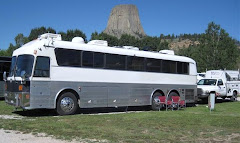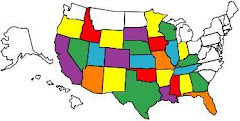Hello from Evergreen, CO
Sunday Morning July 4, 2010 (twelfth travelogue of this trip).
Happy fourth of July everyone.
This was quite a trip. We left in the bus on May 20th. That means we were gone 45 days! Our trip took us through 8 states. We traveled 2900 miles. We even made it home without the benefit of a tow truck {grin}. During this trip we took a side trip, flying to Orlando to spend some time with Mickey and our daughter Lisa and her family.
Up until the last few days the bus did very well. In Kansas, we got a warning light that the water temperature was shutting the engine down. Water temperature has never been a problem. When I started to check out the problem, I found that the air line that turns on the radiator fan was melted and the fan was not turning. The water temperature got over 230 degrees, which is very high for a diesel and at the point that engine damage could occur!
Before I left home, I noted that some of the exhaust insulation had come loose, but I did not have enough time to fix it. The huge amount of exhaust heat coupled with the high ambient temperature got the engine compartment hot enough to melt the DOT type tubing (special plastic). The repair was pretty straight forward. However, getting the heart rate and blood pressure to settle down was not quite so simple. I drove the first few miles with my eyes scanning all of the gauges on the SilverLeaf, looking for signs of damage. After two days, and several hundred miles, the engine looks like it did not sustain damage.
Then yesterday, we had THE REAL SCARE – two miles from home. It is a very tough pull up long steep hills to get to our house (7500 feet). I had been keeping a close watch on the charge air temperature and was controlling it pretty well with some water misters that I had installed. We take a strange route home once we get to our tight twisty canyon road. Shortly into the canyon, we turn and go through a subdivision so that we do not hold up the folks who think the are champion race car drivers {frown}. In that subdivision, my fire suppression system warned me that the compartment temperature was getting high. About that time, it dawned on me that power was not getting to the wheels. The latter could be either a failed drive shaft, or worse yet, a failed rear end (think several thousand dollars). I checked and my engine water temperature was also climbing. My thought: two separate problems.
After I opened the engine hatch in the bedroom (180 degree engine compartment temperature overwhelmed the bedroom, I found another melted air line. This time, it was a major supply line. The fix was, again, pretty easy. As I was working on the fix, I recalled that my 10 speed transmission has an air operated “air shifter”. Could it be that the lack of air had put the range shifter in what would act like neutral? Well, that was the case! All was well and we proudly drove home without the tow truck.
Back to the last couple of days of this trip. From Junction City to Denver, it is 500 miles and we just did not feel like busting our tail to get home. We were pretty worn out from all the activities of this trip and I needed to do a bit of work on the bus before we hit the big hills. Our decision was to drive about 300 miles one day and then have an easy trip home the last day.
We ended up in Goodland, KS early in the afternoon on Friday. Of course, we stayed in a Wal Mart. We had to run the generator for the afternoon and early evening because it was very hot and we had to needed the roof airs. That kept us very comfortable. I had to fight a terrible side wind most of the way from Junction City to Goodland. Thank goodness the bus does well with GUSTING side winds. Had we been in the motorhome, we would have had to stop. We did get a kick out of seeing several folks trying to get their awing rolled up on the side of the road. A few years ago a huge side wind unrolled the awning on our motorhome and blew it over the top. It was not a fun job to get everything back in place!
We parked in the Wal Mart such that the wind was blowing on the side of the bus and it rocked us pretty badly until late evening.
As a part of my effort to keep make the charge air cooler more effective (keep the air inlet temperature down), I have been playing with water misters. This is a technique that many folks use on buses that have water temperature issues. The concept is to spray the radiator or charge air cooler with water from the domestic water supply tank. I have made many iterations of the system, but none seemed all that effective. So, I decided to redo the system once again. I walked over to a farm supply store, hoping to find a agricultural spray head that would work. They had spray heads, but none were easily adaptable. Then the light went on. I use special spray nozzles on my fire suppression system that would be just the ticket. I cut up my existing system and modified it so that I could use my heads. They flow a lot of fluid (2.25 gallons in 45 seconds with three heads). So, I have to flip on the switch on for only a few seconds at a time when the temperature got too high. The testing I did on the hills of SW Kansas and eastern CO suggested that they did a good job and would allow me to climb the big long hills to our house with minimal problem. Turned out that was the case.
I have been working on the hydraulic fan system (some details in previous posts) and think I have the handle on how to make it work better (change to a more viscous fluid). All in all, I think I have the charge air cooler problem at a manageable level.
That is all for this trip. We leave again next Sunday to travel to Custer, SD for an Eagle Bus rally. Stay tuned.
Subscribe to:
Post Comments (Atom)
.jpg)

2 comments:
We are so glad to have you home safely, especially under your own power! Great to be back in cool Colorado, but of course you were able to engineer your way home, and from your own system no less. Is it something that needs to be added to your system? Some more work possibly? Just what you need-ha!
Love,
Judy
Some good trouble-shooting going on! Glad to hear you made it home under your own power.
Post a Comment